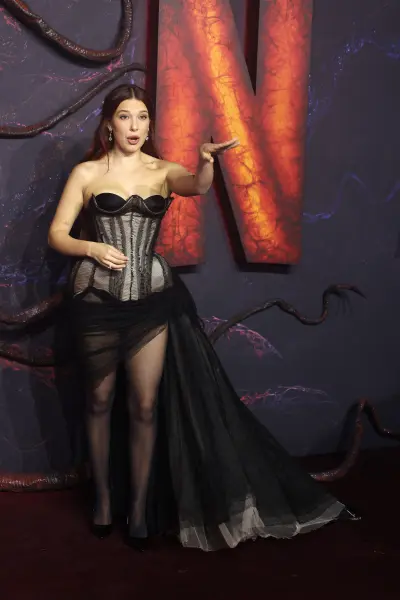At the “Stranger Things” Season 5 Premiere, Millie Bobby Brown Snaps at Photographer After Being Told to “Smile” — Inside the Viral Red Carpet Moment
Millie Bobby Brown has walked countless red carpets since she first stepped into the global spotlight at just 12 years old, but on a chilly November night in London, during one of the biggest premieres of her career, the 21-year-old actress reminded everyone that even seasoned stars have limits. At the premiere of “Stranger Things” Season 5 — the final chapter of the blockbuster Netflix series that made her a household name — Brown found herself at the center of an unexpected and deeply human moment when a brief exchange with a photographer abruptly shifted the mood on the carpet. It was a moment that lasted only a few seconds, but its rawness and honesty instantly went viral.
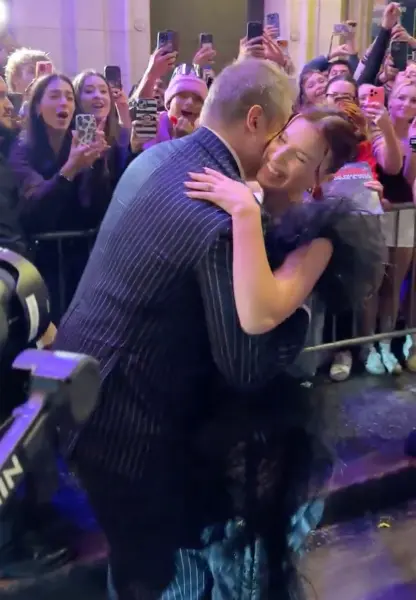
The premiere itself had all the energy and spectacle expected from the return of one of television’s most culturally dominant shows. Fans lined the barricades, braving the cold to catch a glimpse of the cast they had grown up watching. The venue, dressed in Hawkins-themed set pieces and glowing with reds and blacks reminiscent of the show’s eerie Upside Down, pulsed with anticipation. Brown arrived wearing a dramatic sheer black gown with a structured corset bodice, her copper-toned hair flowing past her shoulders. The look was bold — both ethereal and powerful — a symbolic nod to her own transformation from child star to fully realized adult performer.
Reporters shouted questions, cameras flashed in rapid bursts, and fans called out her name from every corner. For a moment, she seemed in her element: composed, gracious, determined. But then, as she paused to adjust her stance for a new cluster of photographers, one voice broke through the chaotic chorus with a blunt command: “Smile!”
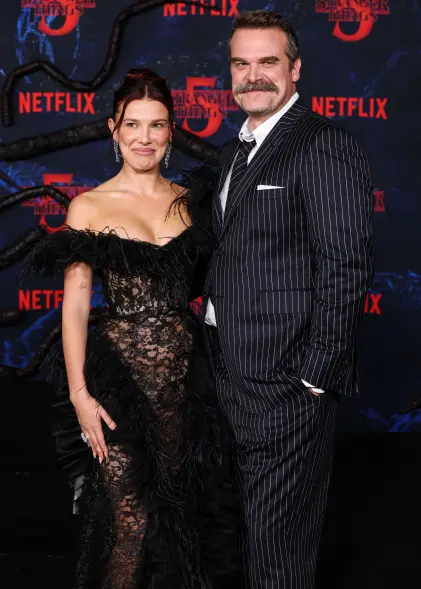
It’s a word women — particularly young women in the public eye — hear far too often. A directive disguised as encouragement. A reminder, intentional or not, of an expectation that women must always appear pleasant, approachable, and visually agreeable, even when they are tired, overstimulated, or simply lost in the moment.
Brown’s reaction came swiftly. She looked toward the source of the voice, pointed firmly, and snapped, “Smile? You smile!” Her tone carried a mixture of disbelief and irritation, the kind that emerges when someone’s patience has been worn thin. It wasn’t a meltdown, nor was it a dramatic outburst. But it was sharp enough to silence the immediate area for a beat — an unfiltered response from someone who has spent nearly half her life under a microscope.
She turned back toward the cameras, regaining her composure almost instantly, but the exchange was captured by multiple lenses and quickly became one of the most shared clips from the event. Within minutes, the moment was circulating across social platforms with subtitles, rewinds, and commentary. For some, it was surprising. For others, it was relatable. For many young women, it felt familiar.
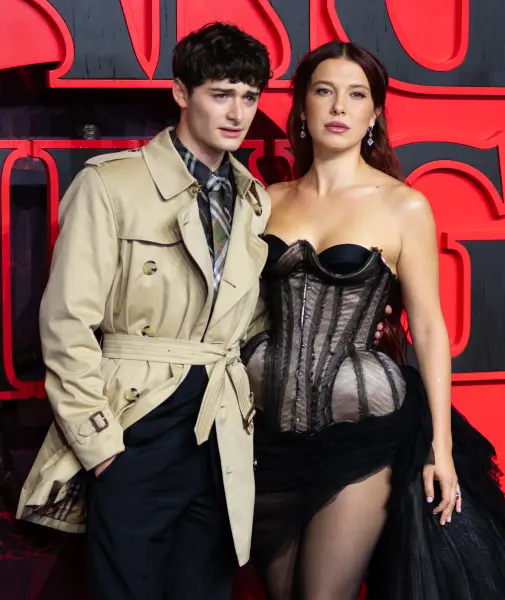
Those who witnessed the moment firsthand said it wasn’t fueled by hostility but by exhaustion. Brown had been making appearances for weeks leading up to the premiere as part of the promotional cycle. Between international travel, interviews, press obligations, fan interactions, and the emotional weight of saying goodbye to a character who has defined her adolescence, the strain was evident.
It’s important to contextualize this moment within the broader experience Brown has had as a public figure. She has spoken openly over the years about the challenges of growing up in the spotlight — facing invasive fans, enduring inappropriate comments when she was still a minor, and being scrutinized relentlessly both online and in person. She has talked about how small moments that may seem trivial in isolation can accumulate into something heavier. A shouted instruction to “smile” may appear harmless, but in the life of someone who has been photographed, critiqued, and instructed for nearly a decade, it can hit differently.
Despite the tense moment, Brown remained professional throughout the rest of the event. She posed with co-stars, greeted fans warmly, and even stopped to sign autographs and chat with children who had dressed up as Eleven for the occasion. Those who interacted with her described her as gracious and energetic. The moment with the photographer did not define the evening, but it reflected an honest piece of what it means to live in constant visibility.

It also highlighted a recurring red-carpet issue in the entertainment industry: the behavior of photographers during high-pressure events. Red carpets are fast-paced environments where photographers often shout instructions to help celebrities adjust their poses or look in certain directions. Most directives are neutral — a request to turn, shift, hold still, or look toward a lens. But the “Smile!” command has long been criticized, especially when directed disproportionately at women. Many actresses have recounted moments where they were instructed to smile even when their male co-stars were not.
This context adds depth to Brown’s reaction. Her tone, while sharp, was not unwarranted. It was a response to an expectation that women must remain “pleasant,” regardless of how they actually feel. In an industry that preaches authenticity but often demands perfection, Brown’s moment of honesty struck a chord.
After the premiere, the discourse online quickly split into familiar camps. Some viewers defended Brown wholeheartedly, expressing that celebrities are not mannequins and should not be commanded to perform happiness on cue. Others speculated that she may have been overwhelmed or simply tired, offering empathy for the pressures she faces at such a young age. A smaller group insisted that the moment was blown out of proportion — a brief interaction magnified by the viral nature of social media.
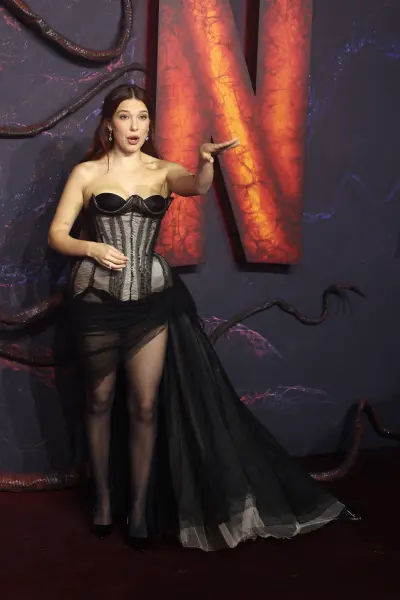
As the conversation grew, one thing became clear: the world has watched Millie Bobby Brown grow up, and with that comes a uniquely complicated relationship with how she is perceived. She is no longer the child who shaved her head to play Eleven. She is an adult navigating an industry that remembers her as a kid but expects her to operate with the maturity of someone twice her age.
In interviews leading up to Season 5, Brown expressed how bittersweet it feels to close this chapter. “Stranger Things” shaped her adolescence, her career, and her understanding of fame. The cast often describes themselves as a family, bonded by a shared experience of rising to global fame almost overnight. The London premiere was emotional for everyone involved, marking the beginning of the end of a story that defined a generation of viewers.
For Brown, that emotional weight was paired with the pressures of stardom — the expectations of fans, the scrutiny of the media, and the constant balancing act of presenting confidence while protecting her own well-being. That one heated moment has now become a symbol of something bigger: a reminder that celebrities are human, that boundaries matter, and that even the brightest lights of Hollywood deserve space to exist authentically.
In the days that followed, representatives close to the event clarified that there were no ongoing issues between Brown and the photographers and that the moment stemmed from a brief misunderstanding. The photographer involved has not spoken publicly, but sources from the press line indicated that shouting directions is standard practice during such crowded and chaotic environments.
As fans look ahead to the premiere of “Stranger Things” Season 5, the moment on the red carpet will likely fade into a footnote. What will remain is Brown’s transformation — not just as an actress, but as a young woman learning to navigate her own boundaries in an industry that rarely respects them automatically.
Brown’s unfiltered reaction may not have been polished, but it was real. And in a world where celebrities are increasingly expected to perform perfection, authenticity — even in a tense moment — resonates far more deeply than a forced smile ever could.
